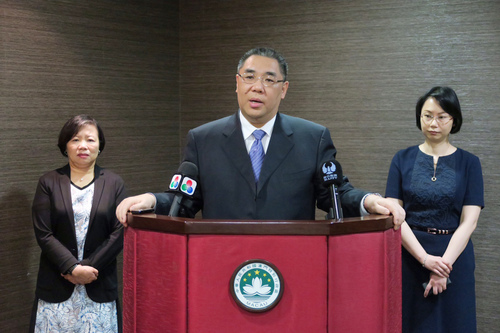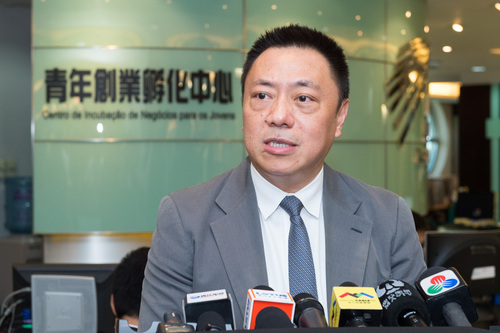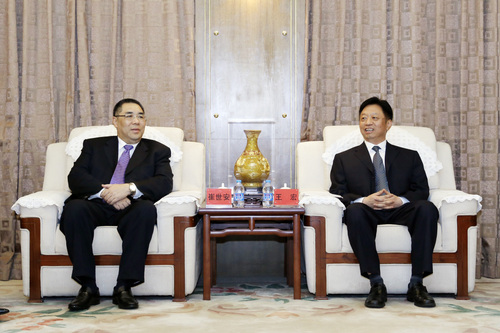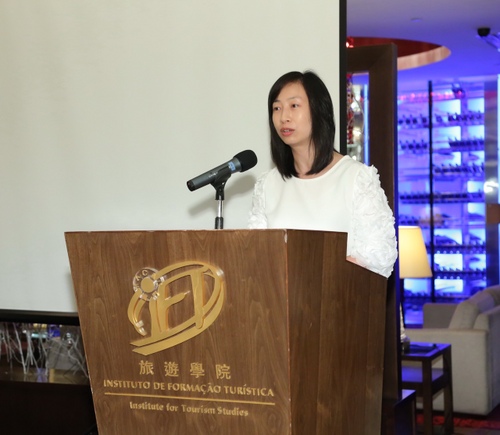Macao SAR Government Portal
News
CE leads team to co-operation conference
The Chief Executive Mr Chui Sai On will lead a team to Jiangmen on Thursday (25 June) for the 2015 Guangdong-Macao Co-operation Joint Conference. Mr Chui and the Governor of Guangdong Province, Mr Zhu Xiaodan, would review past achievements and discuss issues of mutual interests. These include the further strengthening and liberalisation in commerce; boost the China (Guangdong) Pilot Free Trade Zone; implement major tasks in 2015 for the Framework Agreement on Co-operation between Guangdong and Macao; promote Hengqin in Zhuhai, Nansha of Guangzhou, Cuiheng of Zhongshan, and Daguang Bay in Jiangmen as platforms for Macao’s adequate diversification of its economy. The acceleration of the construction of the new checkpoint and co-operation in the movement of pleasure crafts between the Macao and Guangdong, environmental protection, medical services, culture, welfare and social security would also be discussed. The two governments would endorse several agreements during the meeting. Officials accompanying Mr Chui in the meeting would include the Secretary for Economy and Finance, Mr Leong Vai Tac, and the Chief-of-Office of the Chief Executive’s Office, Ms O Lam. Secretary for Administration and Justice, Ms Chan Hoi Fan, will be the Acting Chief Executive while Mr Chui is away.
…
Visitor arrivals for May 2015
Information from the Statistics and Census Service (DSEC) indicated that visitor arrivals edging up from April (2,547,435) to 2,548,562 in May 2015, an increase of 0.9% year-on-year; same-day visitors totalled 1,386,839 (54.4% of total), up by 2.6%. The average length of stay of visitors increased by 0.1 day year-on-year to 1.1 days; overnight and same-day visitors had an average stay of 2.2 days and 0.2 day respectively. Visitors from Mainland China totalled 1,690,987, up by 3.6% month-to-month but down slightly by 0.5% year-on-year; those travelling under the Individual Visit Scheme increased by 3.5% year-on-year to 752,982. Mainland visitors came primarily from Guangdong Province (731,215), Fujian Province (72,544) and Hunan Province (69,083). Visitors from Hong Kong (522,532), Taiwan (76,450) and the Republic of Korea (52,298) increased by 5.1%, 0.6% and 31.4% respectively year-on-year, while those from Japan (24,363) decreased by 8.4%. Long-haul visitors from the United States (15,949) and the United Kingdom (5,117) registered year-on-year increase, whereas those from Australia (7,624) and Canada (6,289) saw decline. Regarding mode of transport, visitor arrivals by land totalled 1,384,263, down by 2.4% year-on-year; visitors entering through the Border Gate accounted for 88.2% of the total, at 1,220,627, down by 4.0%, while those arriving via the Checkpoint of Cotai rose by 13.4% to 161,294. Visitor arrivals by sea increased by 5.8% year-on-year to 991,323, of which visitors entering via the Outer Harbour (612,707) and the Provisional Ferry Terminal in Taipa (351,163) rose by 6.8% and 7.6%. Visitor arrivals by air increased by 1.4% year-on-year to 172,976, with 172,053 entering via the airport, up by 2.3%. In the first five months of 2015, visitor arrivals totalled 12,508,218, down by 2.7% year-on-year, with same-day visitors rising by 1.0% to 6,967,731 (55.7% of total). Visitors from Mainland China (8,349,603) and Hong Kong (2,631,363) decreased by 3.1% and 0.7% respectively year-on-year, while those from Taiwan (385,225) and the Republic of Korea (262,157) increased by 1.4% and 16.0%. Moreover, long-haul visitors from the United States, Australia, Canada and the United Kingdom recorded year-on-year decrease.
…
Consumer Price Index (CPI) for May 2015
Information from the Statistics and Census Service (DSEC) indicated that the Composite CPI for May 2015 increased by 4.93% year-on-year to 105.39, up from the 4.51% growth in April 2015, attributable to higher rentals for dwellings and rising charges for eating out. In comparison with May 2014, notable increase was observed in the price index of Housing & Fuels (+9.93%); Health (+6.02%); Household Goods & Furnishings (+5.43%) and Food & Non-Alcoholic Beverages (+5.16%) on account of rising rentals for dwellings, dearer charges for eating out and out-patient services, as well as higher wages of domestic helpers. On the contrary, price index of Alcoholic Beverages & Tobacco (-2.07%) showed marked decrease. The CPI-A (105.59) and CPI-B (103.74) increased by 5.42% and 3.89% respectively year-on-year. The Composite CPI for May 2015 increased by 0.50% month-to-month. Higher prices of women’s clothing and footwear, rising wages of domestic helpers and dearer charges for out-patient services pushed up the price index of Clothing & Footwear, Household Goods & Furnishings and Health by 1.29%, 0.93% and 0.92%. Moreover, higher prices of Liquefied Petroleum Gas and gasoline drove up the Composite CPI by 0.13 percentage points month-to-month. On the other hand, receding prices of vegetables and seafood tapered off the increase in the price index of Food & Non-Alcoholic Beverages. The CPI-A and CPI-B rose by 0.51% and 0.41% respectively month-to-month. For the 12 months ended May 2015, the average Composite CPI increased by 5.52% from the previous period. Price index of Housing & Fuels (+11.31%); Food & Non-Alcoholic Beverages (+5.59%) and Health (+4.94%) showed remarkable increase. The average CPI-A and CPI-B rose by 6.00% and 5.08% respectively. The average Composite CPI for the first five months of 2015 increased by 4.92% year-on-year, with the price index of Housing & Fuels; Health; and Food & Non-Alcoholic Beverages rising by 10.53%, 5.56% and 5.12% respectively. The average CPI-A and CPI-B rose by 5.35% and 4.15% respectively. The Composite CPI reflects the impact of price changes on the general households. The CPI-A relates to about 50% of the households, which have an average monthly expenditure of MOP10,000 to MOP29,999. The CPI-B relates to about 30% of the households, which have an average monthly expenditure of MOP30,000 to MOP54,999.
…
Centre facilitates young people in business
The establishment of the Business Incubation Centre for Youth could further facilitate young people in realising their dreams of setting up businesses and seize favourable opportunities in regional co-operation. Secretary for Economy and Finance, Mr Leong Vai Tac, who spoke to reporter after the plague-unveiling ceremony for the Centre on 18 June, said the Government had always given its best support to young entrepreneurs not only financially but also in providing resources such as business matching, information of the industries, and offering them places to work and meeting guests. The Centre is one of the Government’s approaches to enhance local employment environment, aimed at optimising the cross-departmental mechanisms for better business services; strengthen co-operation with non-government organisations for pilot projects for young entrepreneurs; provide administrative assistance and latest information of the sector; and optimise structure of departments and legislation. When asked, the Secretary re-iterated that the Government had always been prepared for the drop in revenue from gaming. If the drop reached a certain limit, the Government would introduce stricter measures for the use of public funds. But social welfare, services for the people’s livelihood, necessary public projects and the Wealth Partaking Scheme would not be affected. He said he estimated revenue from gaming this month would continue to follow the drop in the past few months, but experience from the past indicated that June figures would be lower, even in times of rises.
…
Consumer Council released its latest ‘Supermarket price survey’ Surveyed spots included supermarkets in São Lázaro and São Lourenço Parishes
Consumer Council conducted its sixth ‘Supermarket price survey’ in June on 18 June for the implementation of Section 2b), Article 10, Law 4/95/M of 12 June. Surveyed locations included supermarkets in São Lázaro and São Lourenço Parishes. The latest ‘Supermarket Price Survey’ is now available on Consumer Council’s website (www.consumer.gov.mo), ‘Supermarket Price Information Platform’ iPhone and Android apps, and on the Council’s WeChat account page. The survey is also available free of charge at the offices of Consumer Council, IACM’s Iao Hon and S. Domingos Markets, bookstores and libraries. Consumers may also access the resources through WAP channels on their mobile phones. With reference to the local six parishes and the number of supermarkets in each parish, the Council has divided around 100 supermarkets into 8 areas for price collection. The Council collects prices from these supermarkets for the provision of a more comprehensive database for consumers to check price discrepancies and make price comparisons according to their desired locations. For inquiry, please call 8988 9315.
…
Officials to explain 16 cases of “idle plots”

Government officials will explain to the Legislative Assembly the legal grounds for rescinding the decisions on 16 sites that were previously classified as “idle plots”, the Chief Executive, Mr Chui Sai On, said today. Every decision the Government made is law-abiding and according to a series of legal and administrative procedures, he stressed. Speaking to reporters in Beijing before ending his three-day visit, Mr Chui said the Government would spare no efforts in the work on recovering “idle plots”, which developers had failed to develop according to the time and terms stated in the agreements, to safeguard the public interest and maintain the long-term prosperity of Macao. To work in line with the Government policy directions, the former Secretary for Transportation and Public Works, Mr Lau Si Io, had set up an expert team and a string of procedures for recovering leased but not developed plots of land during his tenure. The Government had far revoked the decision on 18 “idle plots” since 2009. As to his present visit to Beijing, Mr Chui said he was confident that the work of specifying Macao’s jurisdiction over its “customary waters” would be completed by the end of this year. He disclosed that he had in meeting officials from the State Oceanic Administration explored issues such as how to seize the emerging opportunities in maritime economy under the nation’s strategic development. On boundary-crossing measures, he said he hoped they would help relieve the pressure on the Gongbei-Macao checkpoints would be approved by the Central Government. The Government would inform the Central Government on how Macao could contribute in countrywide economic development and the “Belt and Road” initiative – the Silk Road Economic Belt and the 21st Century Maritime Silk Road. Further information would be announced in due course.
…
CE discuss boundary issues with officials in Beijing
The Chief Executive, Mr Chui Sai On, has met with officials in Beijing to exchange views on the optimisation of boundary-crossing measures and Macao’s jurisdiction over its “customary waters”. In the meeting on 17 June with the Minister of the General Administration of China Customs, Mr Yu Guangzhou, Mr Chui said he hoped to broaden the common consensus on the optimisation of the boundary-crossing model and the reform on boundary checkpoints. Mr Yu said he had several meetings with Mr Chui to explore ways to strengthen co-operation in economic development. Following the meeting, Mr Chui met with the Director of the State Oceanic Administration, Mr Wang Hong, to exchange views on topic of common interests, especially how Macao could contribute in the national development strategy “Belt and Road”, which refers to the Silk Road Economic Belt and the 21st Century Maritime Silk Road. The Government has started the work on defining its “customary waters” with the Administration, in line with the suggestion of the Central Government. Mr Chui thanked the Administration for its support over the years, especially on the work of the five reclamation of land approved by the Central Government, and the development of the mass transit railway in Macao, as the project required the Administration’s advice on reclaiming two acres of land from the sea. Officials accompanying Mr Chui in the meetings included the Chief-of-Office of the Chief Executive’s Office, Ms O Lam; the Director of the Government Information Bureau, Mr Chan Chi Ping; and the Director of the Protocol, Public Relations and External Affairs Office, Mr Fung Sio Weng. Officials who were also present included Vice Minister of the General Administration of China Customs Mr Lu Bin, Chief of the for National Border Checkpoints Mr Huang Shengqiang and Head of the Office Mr Zhang Guangzhi, together with Deputy Director of the State Oceanic Administration Mr Zhang Hongsheng and Head of the Office Mr Shi Qingfeng.
…
Extension of withdrawal period of the MOP10 notes issued in 1991 & 1995
In accordance with the stipulation of the Despacho do Chefe do Executivo No.117/2015, the withdrawal period for the MOP10.00 banknotes issued by Banco Nacional Ultramarino, S.A.(Authorized by Decreto Lei No. 40/91/M on 8th July) and by Bank of China (Macao Branch) (Authorized by Decreto Lei No.8/95/M on 30th Jan) has been extended to 26th May 2018. The Monetary Authority of Macao would like to remind citizens with the aforementioned banknotes in their possession to have their notes exchanged at Issuing Banks within the stated period.
…
Airport conducts exercise on unlawful seizure of aircraft to test the capacity of personnel involved in the emergency
The annual security exercise with “unlawful seizure of aircraft” for this year’s theme was conducted in Macau International Airport in today’s early morning (18 June 2015). The exercise simulated the scenario that a foreign political organization that has activated several terrorist attacks in their own country has unlawfully seized an aircraft and requested to land in Macau International Airport. The airport immediately activated the emergency plan to handle the incident and rescued the passengers and the crew members eventually. The exercise was deemed to have reached its goal. Public Security Police Force was the coordinator of the exercise which took place from 00:00 to 05:30. About 250 people participated in it. The exercise aimed at testing and assessing the efficiency of the airport emergency plan and the action plans of the various participating entities. An aircraft was simulated to be unlawfully seized by 4 members of a foreign terrorist organization that requested to land the aircraft in Macau International Airport. The hijackers were armed with weapons; the passengers and the crew members on board were held captive. When the captain of the aircraft notified the airport control tower of the incident, the control tower immediately communicated the incident with the relevant entities in accordance with the airport emergency plan. The Airport Emergency Operations Centre was activated and representatives from all relevant entities arrived at the centre to handle the incident. The authorities eventually arrested the hijackers and rescued all the passengers and the crew members. Apart from Public Security Police Force, the other participating entities were Unitary Police Force, Macao Customs Services, Security Coordination Office, Judiciary Police, Fire Services Bureau, Health Bureau, Marine and Water Bureau, Civil Aviation Authority, CAM-Macau International Airport Company Ltd, Administration of Airports, Ltd., Air Macau Company Ltd., Macau Security Company Ltd. (airport security) and Menzies Macau Airport Services Ltd. To enhance the capacity of the entities and the personnel involving in airport security to handle incidents of unlawful interference, the International Civil Aviation Organization requests all countries or administrations to carry out a security exercise once every two years. Although Macao is considered a low risk place in terms of terrorism, the need to guarantee the safety of passengers and their properties is always kept as the priority work by the Facilitation and Security Committee. The Committee adopts a higher standard than the international one by incorporating, on an annual basis, a security exercise as part of the training activities in the yearly schedule of events.
…
IFT organises 20th anniversary media dinner
The Institute for Tourism Studies (IFT) hosted the 20th anniversary media dinner at IFT’s Educational Restaurant on 17 June. The attending media from local newspapers, magazines and television outlets were warmly welcomed by Dr. Fanny Vong, President of IFT, Mrs. Diamantina Coimbra, Director of Tourism and Hotel School, Mr. Oscar Ho, Regent of Internship Programme and Ms. Tannia O, Functional Head of International Affairs. President Vong expressed her gratitude to the continuous support from the Macao SAR Government, industries, community and media over the years. With the support, IFT has developed itself locally and internationally along with Macao’s tourism development. She also mentioned that as the only higher education institution in Macao specialised in tourism and hospitality, through the past two decades of development, IFT has made significant progress in various areas, with increasing student intake, quality and variety of programmes and courses, as well as teaching and research strength. The Institute is not simply the first educational institution being recognised with the “UNWTO.TedQual Certification” by the United Nations World Tourism Organization(UNWTO). Besides, 3 more degree programmes were recognised by them this year. In total, 7 out of 8 degree programmes have been recognised by the Certification, leading IFT to become the higher education institution with the most bachelor degree programmes being recognised by the UNWTOin the world. In 2014, IFT was also honoured “Best Educational Organizational Brand and Service” in the “3rd Macao Elite Service Award” as voted and supported by the public. In 2013, the Institute became the first higher education institution in Macao and Hong Kong to gain the ISO 20000 accreditation. The number of four-year undergraduate students has increased by more than 13 times, from a hundred in the beginning to currently over 1,500 students while an average of 20,000 people participated in professional training courses every year. At present, IFT offers 6 daytime degree programmes and 2 evening degree programmes in culinary management, hotel management, heritage management, tourism business, events, retail & marketing. The Institute keeps introducing new professional training courses, with hundreds of fundamental, advanced and higher level courses offered every year, some of which are international qualification courses co-organised with up to 19 international certified organisations around the world. Furthermore, it co-organises executive development programmes together with world-renowned Cornell University School of Hotel Administration, the United States and Ecole Hoteliere de Lausanne, Switzerland every year, enabling the local hotel industry executives and professionals to keep abreast of the latest development and trends of hotel management. IFT aims at developing into an international leading institution. Its excellent education quality attracts international students and exchange students from 16 counties and regions to the Institute to study. It adheres to invite scholars and industry elites through global recruitment to join the teaching crew, in order to form a strong team with considerable academic attainments and practical experiences. In recent years, the number of researches published by the academic members has increased substantially, and the faculty members are often invited to other institutions for talks and exchanges, and also appointed by Macao SAR Government to conduct research projects and provide professional advices. IFT maintains close connection with the local as well as global leading organisations in the tourism industry. More than 500 companies and organisations have provided internship opportunities for students, and over 85 institutions and tourism organisations from 27 countries and regions have maintained partnership and cooperation with IFT. IFT is the only institution in Macao that adds practicum courses and half-year internship programme to all undergraduate students, enabling them to establish ties with the industry and gain work experience while they are still at school, bringing them in line with the real work environment more quickly. Last year, the Institute conducted a large-scale survey on the employment situation of alumni. Around 70% of the alumni being interviewed joined the tourism and service industry and a considerable percentage of whom had been promoted to senior executives or mid-senior level positions. With professional knowledge and skills, they are favoured by the industry. A substantial number of alumni chose to pursue master’s degree and even doctoral degree after graduation, and some of them were admitted to renowned universities at home and abroad. The year of 2015 is a milestone for the Institute. With the receiving of the East Asia Hall at the former University of Macau campus and the amendments of Higher Education Law, the Institute will face exciting opportunities for more new development. Looking to the future, the Institute hope to further enhance the hardware facilities, expand the faculty scale, optimise teaching and learning environment, provide quality professional training, undergraduate and master’s degree programmes, and continue to make contributions to the higher education of Macao.
…




